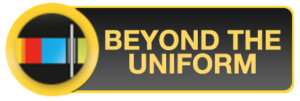“Instead of complaining about what I can't do because I'm in the Navy, I decided what can I do to help the Navy? How can I be the change that I want to see? Because if everyone leaves and decides to get out... I hate to break it to you, it's not that easy. You have all types of irritants. Just like you have irritants in the Navy there are irritants in every industry. That doesn't mean you shouldn't get out, but don't expect to not have irritants. And I've learned to deal with those irritants a lot better. – Nicole Schwegman
Nicole Schwegman is an industry Fellow (Tours with Industry) with USAA and is currently on active duty in the US Navy. She started out at the Naval Academy, after which she served as a Surface Warfare Officer for four years, and then a Public Affairs Officer. She first left the Navy in 2008, where she worked at a small PR firm, as a Contractor for Deloitte, and then as a Communications Partner for Gallup. She returned to Active Duty in 2010 after a deployment to Afghanistan, moved to San Diego, deployed on two different surface ships (USS Essex and USS Peleliu) then got a Master's in Journalism and Media Studies at San Diego State.
In this conversation, we cover a lot of topics, including:
- An overview of the Tours with Industry program, and Nicole's work with USAA
- What it's like working at USAA, and what they do to earn their exceptional customer support reputation
- What Nicole learned from her first transition from the military, and how that affects her view of being on Active Duty now
- How Nicole's perspective on Active Duty is different than the first time she was on Active Duty
- And much, much more…
-
- Listen to it on iTunes.
- Stream by clicking here.
- Download as an MP3 by right-clicking here and choosing “save as.”
QUESTION OF THE DAY: How can I make these episodes more valuable to active duty military personnel considering transitioning to the civilian world? Please let me know in the comments.
Scroll below for links and show notes…
Show Notes
- 2:30 - Nicole's background
- 4:05 - An overview of the Tours with Industry program, and Nicole's work with USAA
- 10:55 - What it's like working at USAA, and what they do to earn their exceptional customer support reputation
- 14:33 - What Nicole learned from her first transition from the military, and how that affects her view of being on Active Duty now
- 24:20 - How Nicole's perspective on Active Duty is different than the first time she was on Active Duty
- 31:00 - How Nicole will approach her next transition from the military



 - taking 1-2 steps weeekly to get you to your goal
- taking 1-2 steps weeekly to get you to your goal







